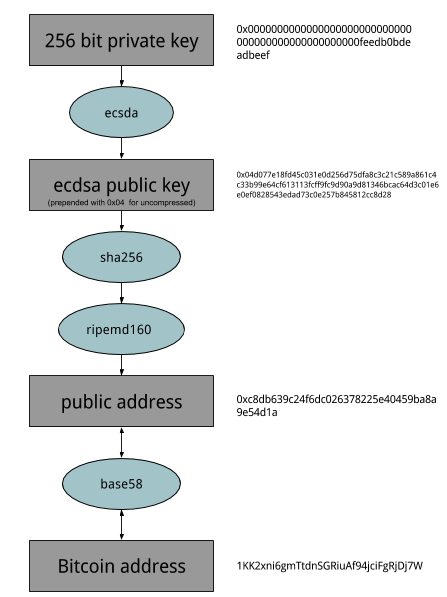Python Generate Private Key Bitcoin
- Generate Bitcoin Private Key Python
- Private Key Bitcoin Hack Tool
- Python Generate Private Key Bitcoin Free
- Python Generate Private Key Bitcoin Generator
The following are code examples for showing how to use ecdsa.SigningKey.generate.They are from open source Python projects. You can vote up the examples you like or vote down the ones you don't like. Hey Bitcoiners, here are my short Python 3 scripts to generate a Bitcoin address. A few months back I wrote some Python 3 scripts to generate Bitcoin addresses. They work just like Brainwallet does, and in fact are 100% comaptible with brainwallet - you can copy the private key into brainwallet and expect everything to work. Python PyCrypto: Generate RSA Keys Example.py. BUT IT DOESN'T WORK WITH THE PRIVATE KEY, JUST RETURNS 0B. This comment has been minimized. Sign in to view. Feb 12, 2018 Bitcoin-Keys-Generator. Python module that generates private key, public key and wallet address from number. Python generators 123. Without any argument, script is. Mar 02, 2018 The private key is already generated. It depends what kind of wallet do you have. A private key in the context of Bitcoin is a secret number that allows bitcoins to be spent. Every Bitcoin wallet contains one or more private keys, which are saved. Jan 21, 2016 A Bitcoin python library for private + public keys, addresses, transactions, & RPC - blockstack/pybitcoin.
Recently, I became interested in the inner workings of Bitcoin – specifically, the way it uses elliptic curve cryptography to generate Bitcoin addresses such as 1PreshX6QrHmsWbSs8pHpz6kLRcj9kdPy6. It inspired me to write another obfuscatedPython script. The following is valid Python code:
See example below. Key figure not added by bw generated analytic view of america.
Python 2.5 – 2.7 is required. Each time you run this script, it generates a Bitcoin address with a matching private key.
So, what’s going on here? Basically, this little script gives you the ability to throw some money around. Obviously, I don’t recommend doing so. I just think it’s cool that such a thing is even possible. Allow me to demonstrate.
Sending Bitcoins to One of These Addresses
To show that the above Python script generates working Bitcoin addresses, I’ll go ahead and send 0.2 BTC – that’s currently over $100 worth – to the first address shown in the above screenshot. I’ll use Bitcoin-Qt, the original Bitcoin desktop wallet.
Here’s the transaction verified on Blockchain.info. Goodbye, 0.2 BTC!

Now, if I didn’t have the private key corresponding to 1AbbYb365sQ5DpZXTKkoXMCDMjLSx6m3pH, those bitcoins would be lost forever. Fortunately, I do have the private key. It was generated by the Python script too.
Generate Bitcoin Private Key Python
Recovering Those Bitcoins
To recover those bitcoins, I’ll use another desktop wallet called Electrum. Under Wallet → Private keys → Import, I can enter the private key:
…and presto! Electrum considers those 0.2 BTC mine to spend once again.
To make sure, let’s send them back to another address.
Private Key Bitcoin Hack Tool
Here’s the final transaction verified on Blockchain.info.
There you have it. We’ve successfully sent money to – and more importantly, back from – a Bitcoin address that was generated by some code shaped like a Bitcoin logo.
Enter CSR and Private Key commandGenerate a private key and CSR by running the following command:Here is the plain text version to copy and paste into your terminal: openssl req -new -newkey rsa:2048 -nodes -keyout server.key -out server.csrNote: Replace “server ” with the domain name you intend to secure. Generate private key from crt and csr. If you already generated the CSR and received your trusted SSL certificate, reference our and disregard the steps below. Log in to your server’s terminal.You will want to log in via Secure Shell (SSH). 3. Enter your CSR detailsEnter the following CSR details when prompted:.
What Does This Illustrate About Bitcoin?
Bitcoin addresses are created out of thin air. First, the script generates a pseudorandom number – that’s the private key. It then multiplies that number by an elliptic curve point to find the matching public key. The public key is shortened by a hash function, producing a Bitcoin address. Finally, both private key and address are encoded as text. Most Bitcoin wallet applications generate addresses in exactly this way.
Randomness ensures that each address is unique. With addresses created out of thin air, you might worry that two different Bitcoin wallets will eventually generate the same address. That’s not impossible, but with a strong pseudorandom number generator, it’s very, very, very, very, very, very, very, very unlikely. There are 2160 possible Bitcoin addresses. If you were to generate one million addresses per second for 5000 years, you’d be more likely to have a meteor fall on your house than to ever see the same address twice.
Python Generate Private Key Bitcoin Free
You must keep your private keys safe! The security of your bitcoins depends entirely on your ability to keep your private keys secret. Normally, your collection of private keys is stored in a wallet, so it’s absolutely critical to keep that wallet safe – whether it’s stored online, encypted to a file on your hard disk, or printed on paper. If you lose access to your wallet, you lose your bitcoins. Likewise, if a thief gains access to your wallet, and bitcoins are still stored at any address inside it, he or she could steal those bitcoins within seconds. Indeed, such thefts happen regularly.
Python Generate Private Key Bitcoin Generator
In researching Bitcoin, I found that there are a lot of smart people who understand Bitcoin very well, and a lot of people who know almost nothing about it. Luckily, the first group has created plenty of resources for learning more. This post was pieced together from information on Wikipedia, this blog post, the Bitcoin wiki, and the original white paper.